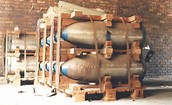JOHANNESBURG, Friday 06.05.2016: The general perceptions, often misinformed, surrounding nuclear development and South Africa’s nuclear-programme need to be unpacked and clarified, so that citizens can make their own informed decisions, rationally, around the subject, industry-proponents urged on Friday.
South Africa’s ambitions of building 9.6 GW of nuclear-power over a number of years until 2040 had been met with mixed response, with many slamming the country’s nuclear proposals based on safety, cost and affordability and capability-concerns.
However, Nuclear Energy Corporation of South Africa (Necsa) chairperson Dr Kelvin Kemm believed the negativity around nuclear was based on what he termed “uninformed reports” and he stated that many reports and perceptions were – as he is reported to have said – based on `emotion and not facts`.
Speaking at a Necsa business-discussion, in Rosebank, on Friday, Kemm contended that a more `rational´ debate was required, with discussions and decision-making processes moved to what he termed a `neutral´ ground away from – as he said – `knee-jerk emotional reactions´.
“It is a psychological effect,” he claimed, citing Japan’s recent unsuccessful shutdown of the Fukushima nuclear-reactor following an earthquake and subsequent tsunami, and the historical Hiroshima disaster, as having instilled what he terms “irrational fear” in citizens over nuclear radiation-exposure.
This was in addition to perceptions of “nuclear electricity”-leakage into homes and exposure to radiation through reactor-leaks.
The Fukushima-Daiichi nuclear-incident itself, which occurred in 2011, was not actually a disaster, the earthquake and tsunami was, Dr Kemm contended.
The frantic shutdown of the Fukushima-Daiichi site came under the spotlight amid widespread panic over radiation-exposure. However, Kemm assured that the actual reactor did not damage property, was not the cause of any deaths and there was no radiation effect on humans post its closure.
In general, there was no “negative human effect” for those exposed to levels below 200 millisievert (mSv), while the region surrounding Fukushima had only reached levels of between 5 mSv and 20 mSv, he claims, adding that the radiation hovering over Johannesburg was actually around half that of the radiation “at the fence” of the Fukushima nuclear plant.
In addition, the nearby second nuclear-site, also impacted by the tsunami, had shut down safely and efficiently. Even the dropping of nuclear-weapons on Hiroshima in the 1940s showed no long-term fall-outs, despite being a major disaster at the time, Kemm said.
The region today showed none of the impacts, such as genetic defects or deformations, that the subsequent fall-out was expected to bring, he commented.
There was a need to overcome the fear and perceptions that historical events linked to nuclear had wrought. Further, Necsa had been successfully leveraging nuclear for medical use, besides other applications, for many years, and receiving acclaim in many cases for its products.
Kemm said that, worldwide, a person was treated every three seconds with medical radioisotopes, and every three days the product saved a life.
Necsa produced radioisotopes for both medical and industrial purposes, exporting the medical radioisotopes to more than 60 countries. Nuclear Industry Association of South Africa MD Knox Msebenzi agreed that perceptions around nuclear were holding back development.
“Nuclear-awareness is low . . . the debate highly politicised,” he commented, adding that the perceptions were “unfortunate” and that more “outreach-programmes” to educate the population and allow them to make their own determinations based on knowledge was needed.
Necsa-CEO Phumzile Tshelane added that nuclear and its application were extremely complex and that there was a need to continually share knowledge on the topic.
Kemm called on industry to rally together to show the public the less publicised benefits of a nuclear- programme, publish studies and statistics on nuclear and campaign on the value of nuclear for South Africa and its economy. Meanwhile, besides concerns around the affordability of the proposed nuclear- build programme, heavily criticised as unfeasible, and the safety of the nuclear-build, there was an inaccurate perception that South Africa lacked the skills and capacity needed to implement 9.6 GW of new nuclear-energy capacity, Kemm said.
South Africa was already a nuclear-country, he said, with decades of experience in handling nuclear applications.
The country’s Koeberg nuclear power station was built taking into consideration every potential scenario, however unlikely, including earthquakes and tsunamis.
“We are not out of our depth,” Kemm assured, saying that the belief that South Africans cannot develop such a complex programme must be dismissed.
Meanwhile, Msebenzi said the nuclear-build programme held significant opportunities for South Africa, including further skills development, substantial job creation, supplier and supply-chain development and the creation of peripheral industries.
“We have an opportunity to choose the best technology and [stimulate] job-creation.”
Further, the more the programme was localised, the less money would leave South Africa’s shores and the more the general skills level of the nation would be enhanced, he concluded.
Source: Polity, 07.05.2016; edited by Ben Khumalo-Seegelken.
>> South Africa and Weapons of Mass-Destruction

Interestingly enough in this chain of pro-nuke arguments Tchernobyl is missing as well as the whole complex of nuclear waste.
I don’t think that the perception of the dangers of nuclear technology re nuclear power stations and atomic weapons is “irrational” or “psychological”. Ever since man started to use nuclear energy on a large scale there has been a chain of smaller and bigger accidents in nuclear power stations, let alone those worst case scenarios like Tchernobyl and Fukushima.
However, what is even more alarming is the unresolved problem of nuclear waste. To my knowledge there is no really safe technology to dispose of nuclear waste. Wherever this waste is disposed of on this planet there is a persistent danger for the environment, for humans, fauna and flora.